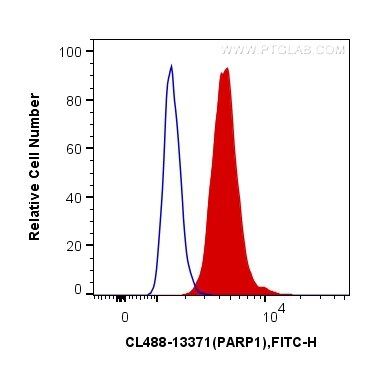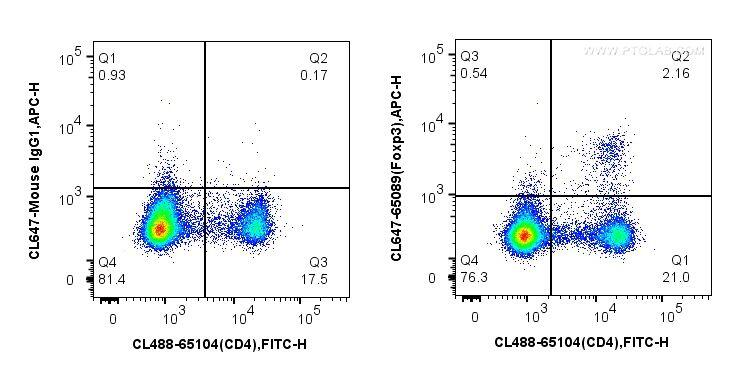PARP1 Polyklonaler Antikörper
PARP1 Polyklonal Antikörper für FC (Intra)
Wirt / Isotyp
Kaninchen / IgG
Getestete Reaktivität
human, Maus, Ratte
Anwendung
FC (Intra)
Konjugation
CoraLite® Plus 488 Fluorescent Dye
Kat-Nr. : CL488-13371
Synonyme
Galerie der Validierungsdaten
Geprüfte Anwendungen
| Erfolgreiche Detektion in FC | K-562-Zellen |
Empfohlene Verdünnung
| Anwendung | Verdünnung |
|---|---|
| Durchflusszytometrie (FC) | FC : 0.20 ug per 10^6 cells in a 100 µl suspension |
| It is recommended that this reagent should be titrated in each testing system to obtain optimal results. | |
| Sample-dependent, check data in validation data gallery | |
Produktinformation
CL488-13371 bindet in FC (Intra) PARP1 und zeigt Reaktivität mit human, Maus, Ratten
| Getestete Reaktivität | human, Maus, Ratte |
| Wirt / Isotyp | Kaninchen / IgG |
| Klonalität | Polyklonal |
| Typ | Antikörper |
| Immunogen | PARP1 fusion protein Ag4193 |
| Vollständiger Name | poly (ADP-ribose) polymerase 1 |
| Berechnetes Molekulargewicht | 1014 aa, 113 kDa |
| Beobachtetes Molekulargewicht | 113-116 kDa, 89 kDa |
| GenBank-Zugangsnummer | BC037545 |
| Gene symbol | PARP1 |
| Gene ID (NCBI) | 142 |
| Konjugation | CoraLite® Plus 488 Fluorescent Dye |
| Excitation/Emission maxima wavelengths | 493 nm / 522 nm |
| Form | Liquid |
| Reinigungsmethode | Antigen-Affinitätsreinigung |
| Lagerungspuffer | BS mit 50% Glyzerin, 0,05% Proclin300, 0,5% BSA, pH 7,3. |
| Lagerungsbedingungen | Bei -20°C lagern. Vor Licht schützen. Aliquotieren ist bei -20oC Lagerung nicht notwendig. 20ul Größen enthalten 0,1% BSA. |
Hintergrundinformationen
PARP1 (poly(ADP-ribose) polymerase 1) is a nuclear enzyme catalyzing the poly(ADP-ribosyl)ation of many key proteins in vivo. The normal function of PARP1 is the routine repair of DNA damage. Activated by DNA strand breaks, the PARP1 is cleaved into an 85 to 89-kDa COOH-terminal fragment and a 24-kDa NH2-terminal peptide by caspases during the apoptotic process. The appearance of PARP fragments is commonly considered as an important biomarker of apoptosis. In addition to caspases, other proteases like calpains, cathepsins, granzymes and matrix metalloproteinases (MMPs) have also been reported to cleave PARP1 and gave rise to fragments ranging from 42-89-kDa. This antibody was generated against the C-terminal region of human PARP1 and it recognizes the full-length as well as the cleavage of the PARP1.
Protokolle
| Produktspezifische Protokolle | |
|---|---|
| FC protocol for CL Plus 488 PARP1 antibody CL488-13371 | Protokoll herunterladen |
| Standard-Protokolle | |
|---|---|
| Klicken Sie hier, um unsere Standardprotokolle anzuzeigen |



